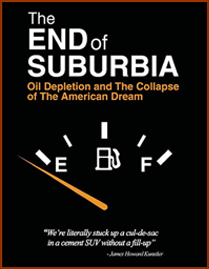Short of reading a book on the subject, this movie presents as convincing a case as I have seen that the foundation for our way of life is ready to crack.
By Ryan McGreal
Published January 14, 2005

The End of Suburbia
The End of Suburbia: Oil Depletion and the Collapse of the American Dream. Directed by Gregory Greene. Produced by Barry Silverthorn and hosted by Barrie Zwicker. Featuring James Howard Kunstler, Peter Calthorpe, Michael Klare, Richard Heinberg, Matthew R. Simmons, Michael C. Ruppert, Julian Darley, Colin Campbell, Kenneth Deffeyes, Ali Samsam Bakhtiari, and Steve Andrews. Running Time: 78 minutes. http://www.postcarbon.org/eos/
(Note: this movie is being shown in January at The Staircase, 27 Dundurn Street North, http://www.staircase.org/. Please check their Event Calendar for details.)
To satisfy a seemingly bottomless appetite for energy, global oil production has grown nearly every year for the past century. However, there is only so much oil in the ground, and we've already used up nearly half of it. Global oil production is about to peak, after which the world's total output will enter an inevitable decline. The date that oil actually runs out is irrelevant: what matters is that every year after the peak, less net energy will be available than the year before.
Every aspect of our economy, from agriculture to industry, communications, shipping, and especially the structure of our towns and cities, depends on cheap oil and natural gas. For an economy based on unlimited growth and addicted to cheap, abundant energy, peak oil is likely to be catastrophic.
This conclusion is outrageous - perhaps too outrageous to penetrate the fog of conventional thinking - but the evidence is overwhelming, and The End of Suburbia, a new documentary film distributed by the Postcarbon Institute, provides an excellent primer on what may already be the most important issue of the twenty-first century.
If you are not familiar with the issues, expect to leave the film shocked and disoriented. This movie smashes the assumption that our car-based culture can survive far into the twenty-first century, predicting that today's sprawling subdivisions will become tomorrow's decayed slums.
It's simply impossible to cover every aspect of energy depletion exhaustively in a 78-minute movie, and Suburbia neglects some key evidence (for example, the fact that new oil discovery peaked in the 1960s and has been in sharp decline for the past decade). Skeptics will doubtless jump on every omission to discredit the film's central message, but don't be seduced by self-delusion dressed up as prudence.
Short of reading a book on the subject, Suburbia presents as convincing a case as I have seen that the foundation for our way of life is ready to crack. Chiding a generation of "Nintendo geologists" too busy playing with graphs to look in the ground and a complacent media that refuses to ask tough questions about energy supplies, this movie seeks out the experts and walks viewers through the history of oil, the best available evidence about its future, the limited prospects of alternatives, and the ramifications for suburban life.
Matthew R. Simmons, an energy investment banker and a member of U.S. Vice President Dick Cheney's 2001 Energy Task Force, is one of the movie's most compelling subjects, flaying the North American energy industry for diminishing reserve markets and rushing toward the brick wall of supply limits. Stating the unthinkable, Simmons announces, "If it turns out that Saudi Arabia has peaked" in oil production, likely given oil-producing nations' tendency to overstate their reserves, "then categorically the world has peaked."
Suburbia gives professional curmudgeon and new urbanism advocate James Howard Kunstler, author of The Geography of Nowhere and Home from Nowhere, plenty of room to sketch out what went wrong with postwar planning and where it's going. Kunstler's irreverent style may offend some, but he provides much-needed levity through his sharp wit. Calling suburbia "the greatest misallocation of resources in the history of the world", Kunstler carries much of this movie's burden, taking the evidence of the experts and extrapolating plausible conclusions.
Featuring interviews with oil geologist Colin J. Campbell, architect Peter Calthorpe, authors Richard Heinberg (see also an interview with Richard Heinberg and a review of his latest books in this issue), Michael C. Ruppert, Julian Darley, Kenneth Deffeyes, and others, The End of Suburbia is like an open window in a McMansion filled with carbon monoxide.
Fight the urge to drift back to sleep, and pay attention to this message. Our future may depend on it.
By David (anonymous) | Posted None at
This movie was very good - with the credibility of Matthew Simmons carrying the weight of the message and supporting the other contributors. I liked that they touched on the media conspiracy to stay away from the subject, although this is a part of the story that deserves more attention. The media reliance on their advertisers, and the advertiser's reliance on the media to not destroy their markets through "fear mongering" limits the mainstream information that we can ever expect to receive, despite the fact that it might be the only way to wake people up before it is too late. Also not covered as well as it might have are the possible scenarios for how this will play out. Perhaps nobody can say, but a good economist might be able to suggest whether some kind of balance will be maintained through the transition, or will it become more of a "snap" to economic destruction, or worse a "post-industrial stone age" due to our lack of ability to change fast enough. As a portion of the economy crumbles due to lack of affordable energy, can the remaining portion support the weight, or does the whole house of cards domino down?
You must be logged in to comment.
There are no upcoming events right now.
Why not post one?